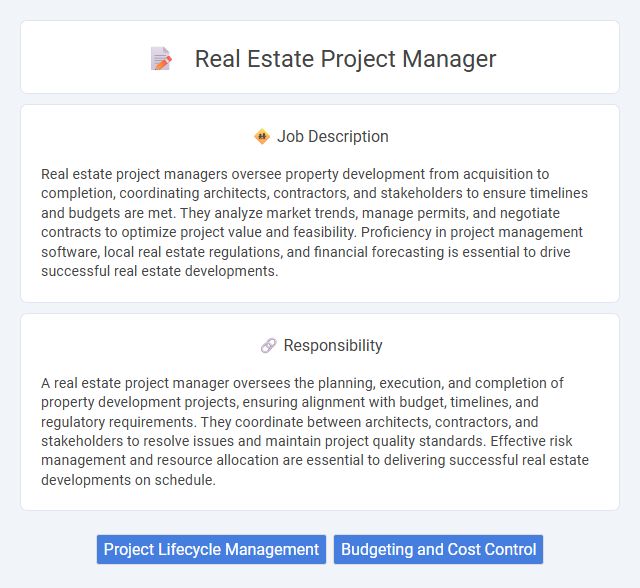
Real estate project managers oversee property development from acquisition to completion, coordinating architects, contractors, and stakeholders to ensure timelines and budgets are met. They analyze market trends, manage permits, and negotiate contracts to optimize project value and feasibility. Proficiency in project management software, local real estate regulations, and financial forecasting is essential to drive successful real estate developments.
Individuals with strong organizational skills, effective communication, and the ability to handle high-pressure situations are likely suitable for a real estate project manager role. Those who thrive in dynamic environments and possess problem-solving abilities may find the job's demands fitting. People who prefer routine tasks or struggle with multitasking might find this position challenging.
Qualification
Real estate project managers typically require a bachelor's degree in construction management, civil engineering, or real estate development, combined with several years of experience in property management or construction projects. Professional certifications such as PMP (Project Management Professional) or LEED Accreditation enhance qualifications by demonstrating expertise in project oversight and sustainable building practices. Strong skills in budgeting, risk management, contract negotiation, and knowledge of zoning laws and construction regulations are essential for successful project execution.
Responsibility
A real estate project manager oversees the planning, execution, and completion of property development projects, ensuring alignment with budget, timelines, and regulatory requirements. They coordinate between architects, contractors, and stakeholders to resolve issues and maintain project quality standards. Effective risk management and resource allocation are essential to delivering successful real estate developments on schedule.
Benefit
A real estate project manager likely experiences significant benefits including enhanced leadership skills and increased industry knowledge that boost career advancement opportunities. The role probably offers financial incentives through project success bonuses and competitive salaries aligned with market demands. Consistent exposure to diverse projects may also improve problem-solving abilities and professional networking possibilities.
Challenge
Real estate project managers likely face significant challenges in coordinating multiple stakeholders, meeting tight deadlines, and managing budget constraints. Handling unexpected issues such as regulatory changes or site complications may require advanced problem-solving skills. The role probably demands constant adaptability to shifting project scopes and market conditions.
Career Advancement
A real estate project manager oversees property development from inception to completion, coordinating teams, budgets, and timelines to ensure successful project delivery. Expertise in market analysis, risk management, and contract negotiation drives career advancement in this role. Progression often leads to senior management positions such as director of development or real estate portfolio manager, where strategic decision-making and leadership skills are paramount.
Key Terms
Project Lifecycle Management
Real estate project managers oversee the entire project lifecycle, from initial feasibility studies and land acquisition to design, construction, and final handover. They coordinate multidisciplinary teams, manage budgets and timelines, and ensure compliance with zoning laws and building codes. Effective project lifecycle management minimizes risks, optimizes resource allocation, and guarantees the successful delivery of real estate developments.
Budgeting and Cost Control
Real estate project managers oversee budgeting by accurately estimating project costs, allocating resources, and monitoring expenditures to ensure financial targets are met. They implement cost control strategies such as variance analysis and regular financial reporting to identify and address budget deviations promptly. Mastery in budgeting tools and software enhances their ability to optimize spending and maximize project profitability.
 kuljobs.com
kuljobs.com